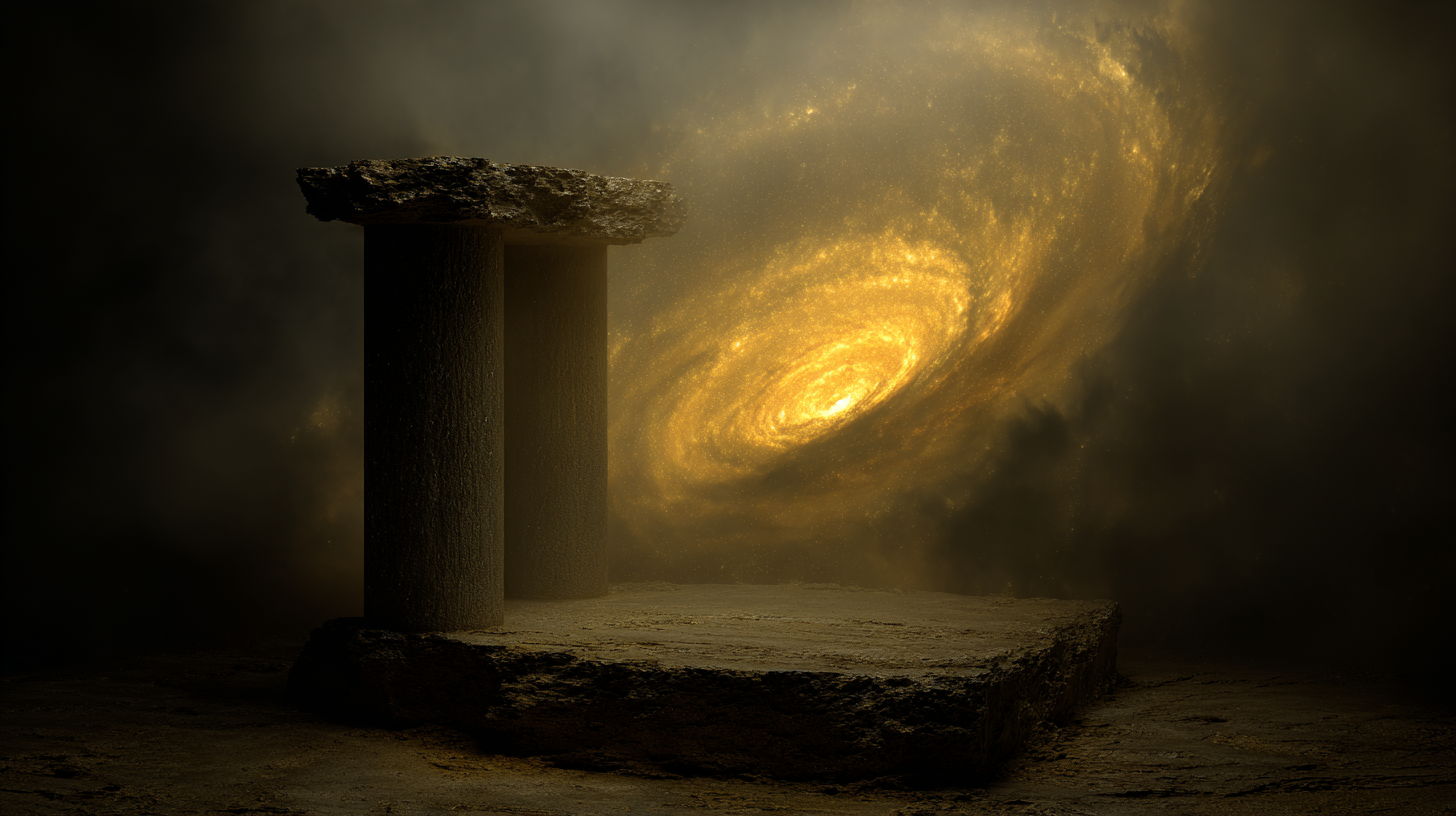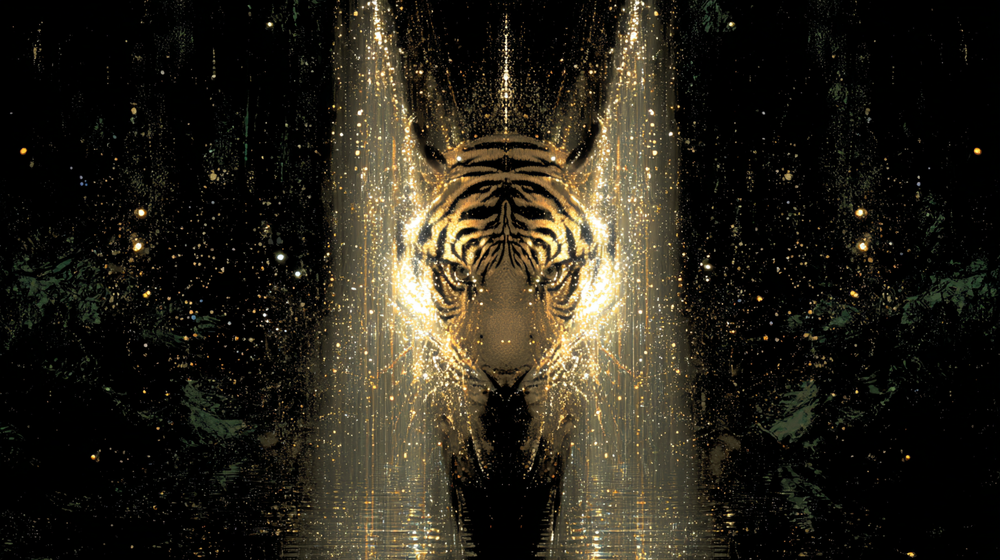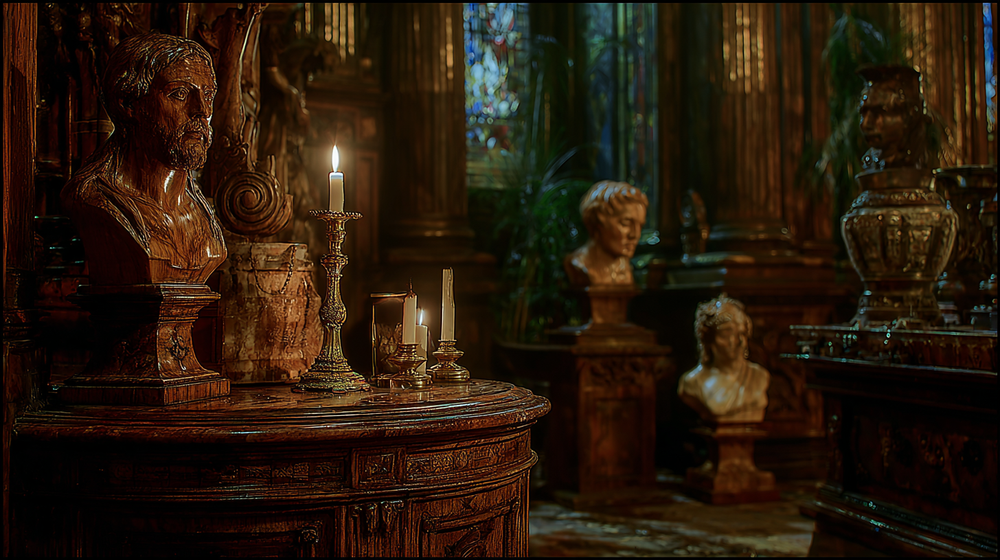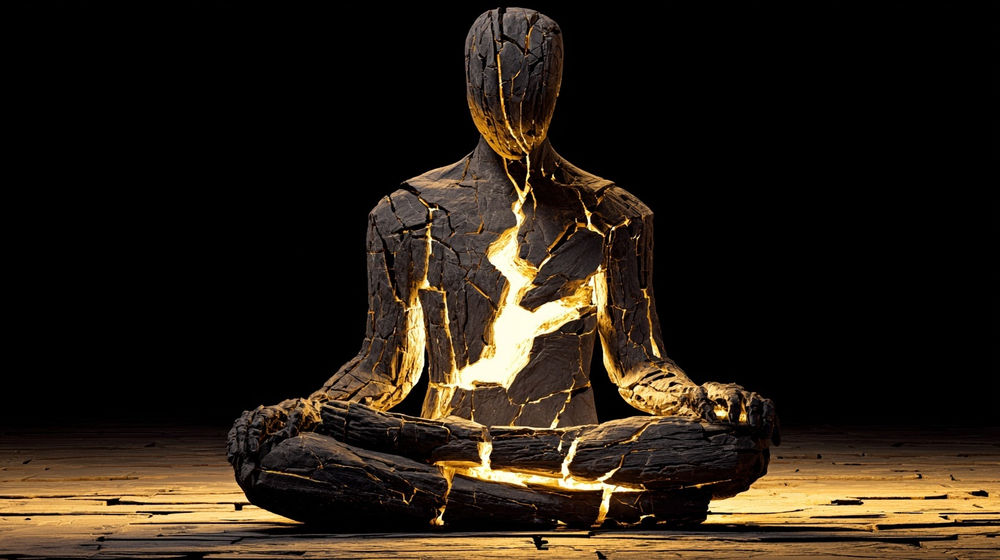Episode 1: Threshold
A new road begins at this threshold. This work is not about new beliefs, but about providing mirrors—stories that reflect the two great illusions that blind us. The goal is not to give answers, but to help you reclaim the one thing that matters: your own inner authority. Welcome.

Introduction
Welcome to the start of a new road. The first episode of this new season, "Threshold," is an introduction to the journey ahead. It begins with the personal vision that has set this entire work in motion, a moment of awakening that revealed the profound disconnect between the world we build and the world we inhabit.
This episode lays the foundation for the core principles of The (all) Unknowing: the diagnosis of the two great illusions that hold us captive, and the mission to dissolve these illusions not with argument, but with the quiet, alchemical power of mirrors.
Each episode to come will be a reflection in one of these mirrors—a single, short parable, story, or dream, designed to illuminate a pattern of the great illusion, leaving you with a question to carry into your own life. Thank you for being here.
The Parable
A man traveled a well-known road to a faraway land. His journey brought him to the most luxurious and immaculate hotel he had ever witnessed. His night arrival allowed the majestic luminescence to shine bright on this pinnacle of human creation. The road was long, and the morning young, so the man went straight to sleep. Upon waking from his slumber, he went and opened the curtains to peer out the window, and, in every direction he could see, for kilometers, people were living in shanties on the side of the road. He went and sat on the bed and thought, What has brought me to this majestic place such that I sit here, and yet the many out there live in such poverty and extreme heat? He contemplated this question for a long time and found, after taking a much different approach, a more difficult and satisfying mountainous road to climb.
Transcript
Hello and welcome to The (all) Unknowing. If you've been with me for a while, you'll notice that things are about to change. If you're new here, then you've arrived at the start of a new road. And it only seems right to begin this new chapter with a story about a road.
There was once a man who traveled a well-known road to a faraway land. His journey brought him to the most luxurious and immaculate hotel he had ever seen. He'd been traveling for a long time, and he was proud of the journey, proud of the destination. He checked in, went straight to his room, and fell asleep.
The next morning, he woke up feeling rested and accomplished. He walked to the window, pulled back the heavy curtains to admire the view, and his heart stopped.
In every direction, for as far as he could see, there were shanties, thousands of them, crammed along the sides of the very road he had just traveled.
He saw people living in extreme poverty, suffering in the heat, all in the shadow of the magnificent tower he was standing in.
He was that man.
I was that man.
And as I stood there, looking out that window, one question burned in my mind, a question that would ultimately undo my entire world. What has brought me to this majestic place, such that I sit here in comfort while so many live and die out there in this extreme heat and poverty? That question set me on a different path, a more difficult, mountainous road to climb.
That journey inward led me to a moment I can only describe as a waking vision. I was sitting in my chair, my eyes closed, meditating on that very question. In my mind's eye, I held up a torch in the darkness.
And I was met with the brightest light I have ever seen. It was overwhelming, disorienting. And when the light finally dissipated, it coalesced into a face. Then a lion approached me from the darkness and roared. It was a sound so real it shook my very being. My first instinct was to open my eyes, but I held steady. The lion circled me.
Its presence an immense weight, before walking on and disappearing back into the void.
Then, a voice asked me what I was seeking. And without a moment's hesitation, I answered: Truth. The response came back instantly. I am Truth. And in that moment, the spirit of a tiger leapt into me.
My hair stood on end, my entire reality tilted on its axis. And in the aftershock of that encounter, a new understanding began to dawn. A simple, devastating one. That the divine, that God was in all things that live—everything and everyone, including the people in the shanties, including the people in the tower.
For weeks after, my body itself was changed. I had no desire for meat, for sex, for any of the old impulses. I was living a different reality.
If that sacred spark is truly in everyone, then why do our systems elevate some and crush others? Why do we build towers for the few and shanties for the many? The problem couldn't be with the divine spark itself. The problem had to lie in the things that blind us to this truth.
Looking through these new eyes, I saw two great illusions that create this blindness. The first is the great external illusion, the belief that systems of power, control, and performative authority are legitimate and necessary. This is the illusion that tells us some people are worth more than others. I call this the Hollow Senex.
The second is the great internal illusion, the belief that we are fundamentally separate from our own soul, and therefore separate from the soul of the world. This is the illusion that fuels our judgment in isolation. I call this the Cancer of Eros.
These two illusions, working together, are the source of the shanties outside the hotel window.
That numinous fire from the tiger burned within me. It was a truth I knew, but could not yet speak; a long and quiet alchemical process that needed time to work in the darkness. Then, a more recent initiatory dream acted as the final catalyst. And what had been slowly gestating for years was suddenly born. In a flood, these stories, these parables about kings and mirrors, foxes and scribes, banks and circuses, the merged whole. And I understood their purpose. They are not meant to be answers. They are mirrors.
Mirrors do not preach or command. They simply reflect. They reveal the patterns of the great illusion, the Maya, so that we can begin to see it for what it is. This work, then, is not a frontal assault on the systems of the world. It is a quiet alchemical process. It is about dissolving the illusions within ourselves with the profound understanding that an external system is only as powerful as the internal illusions we agree to believe. When we change our own seeing, the world we see begins to change with it. And this podcast from this day forward is my commitment to hold up those mirrors.
The format will be simple. Each episode, I will share one of these parables, a single short story. We will look into it together. We will unpack its symbols, explore its meaning, and I will leave you with a question to carry, a question to ask the one in your own mirror.
My hope is not to give you a new belief system that would just be creating another Hollow Senex. The hope is to provide a tool, a mirror that might help you find your own way to reclaim your own inner authority, to learn to govern yourself.
I'm recording this in the quiet hours of Sunday morning here in Wisconsin.
The world outside is mostly asleep, and it feels like the right time for this work to begin.
This is an invitation to join me on a different kind of path. It's a journey not into knowing more, but perhaps into unknowing better. To find the courage to sit with the difficult questions and the compassion to listen for the answers that come from within. Thank you for being here at the threshold.
A Deeper Look: A Guide to the Mirror
In every parable, there are layers of meaning. Here, we will look into the mirror of "The Road" from two perspectives: the simple truth of the heart, and the deeper pattern of the mind.
The Heart of the Story
Imagine a man who followed the treasure map everyone said was the best. After a long journey, he reached a sparkling palace, the promised prize. But when he woke up, he saw that the map had led only him to the palace, while leaving thousands of others behind in the hot sun. He realized, in that moment, that a prize that requires the suffering of others is not a prize at all. The lesson is that sometimes the "easy" road everyone follows leads to a place that feels wrong in the soul. The harder, mountainous path you choose for yourself might be the one that leads to true satisfaction.
The Archetypal Framework
This parable is a phenomenological account of a consciousness awakening to itself. It is the precise moment when material success reveals itself as spiritual poverty, catalyzing a fundamental reorientation of a life's purpose.
- The Well-Known Road as Mimetic Trap: The "well-known road" represents the socially sanctioned path of achievement. The man follows this road not from an authentic calling but because it is validated by collective approval, a phenomenon René Girard termed mimetic desire.
- Night Arrival and Morning Revelation: His arrival at night symbolizes an unconscious participation in the system. The hotel's artificial luminescence is the grand illusion, the Maya. The true light of morning—of awakened consciousness—reveals a devastating truth. This awakening is a direct confrontation with the nature of privilege: the shocking realization that one's own comfort is not separate from, but is structurally connected to, the suffering of the many. The hotel window itself becomes a symbol of how these systems operate, framing mass suffering as mere scenery and rendering the violence of the structure invisible to those who benefit from it.
- The Mountainous Road as the Individuation Path: The choice to leave the horizontal road of accumulation for the "mountainous road" is the classic shift to the vertical ascent of individuation. In myth, mountains are the axis between earth and heaven, the difficult path one must climb to find the Self.
- The Great Refusal: The man's choice to leave the hotel represents what the philosopher Herbert Marcuse called "the Great Refusal"—the rejection of the rewards of an unjust system. But he does not simply reject it; he chooses a more difficult and satisfying path, signaling a move toward transformation, not just opposition.
The parable captures the precise moment a person realizes that winning in an unjust game is a form of spiritual losing. It is the beginning of the journey from success to significance, from having to being, from the well-traveled road of the ego to the steep path of the Self.
The mirror awaits your gaze.
A Final Thought...
This exploration is a reader-supported publication. It is sustained entirely by the generosity of readers like you who believe in the value of this inquiry.
If you found meaning in this piece, please consider becoming a paid supporter. Your contribution, no matter the size, makes this work possible and keeps it accessible to all.
Thank you for reading.
A One-Time Offering
If this particular mirror reflected something meaningful for you, you can make a one-time contribution here:
Author
Sign up for The (all) Unknowing newsletters.
Stay up to date with curated collection of our top stories.



